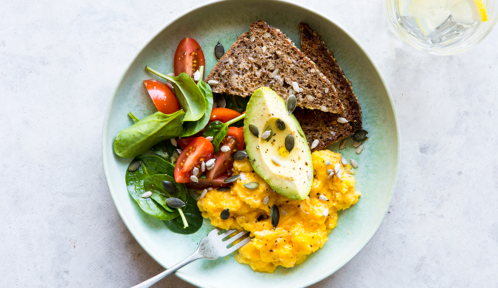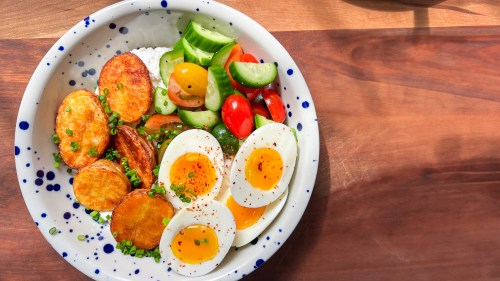The 4-Ingredient Breakfast a Neuroscientist (With 50 Years of Experience) Eats Daily for Long-Term Brain Health
Discover the easy breakfast recipe a neuroscientist with nearly 50 years of experience makes for optimal brain health.

According to Dale Bredesen, MD, a neuroscience researcher and neurodegenerative disease expert, not being a morning person isn’t necessarily a bad thing. In fact, the brain health expert (with nearly 50 years of experience) considers himself a night owl that doesn’t taking to waking up at the crack of dawn and feels most focused and energized in the evening.
Experts in This Article
neuroscience researcher and neurodegenerative disease expert
What actually matters when it comes to energy optimization, according to Dr. Bredesen, is that your rising-from-bed routine is tailored around your body’s unique needs. Ahead, we delve into the best ways to boost cognitive function first thing in the a.m. based on your natural habits, and this brain expert’s favorite four-ingredient breakfast recipe for brain health.
How to make a healthy morning routine for optimal brain health
The first order of business when establishing a healthy morning routine for brain health is deciphering whether or not your circadian rhythm bends more morning person—or “morning lark,” as defined by the sleep chronotype system—vs. night owl. “Step one is to determine whether you are a lark or an owl. In other words, your sleep chronobiology,” Dr. Bredesen says.
According to the Sleep Foundation, a chronotype is the body’s natural inclination to sleep and wake at specific times. Although Dr. Bredesen focuses primarily on two types—lark or owl—taking a chronotype quiz can help further break down which of the four common chronotypes you fall into.
Knowing your chronobiology can be a helpful tool for optimizing your day and nighttime routines. Depending on which chronotype you are, Dr. Bredesen recommends strategies for optimizing these three key segments of your morning routine: food (fuel for the body), relaxation (meditation or mindfulness activity), and exercise (light cardio).
A glimpse into Dr. Bredesen’s owl-centered routine
In terms of Dr. Bredesen’s owl-centered routine (in which he’s prone to being more productive and focused at nighttime), his circadian rhythm begins later than a lark chronotype, aka folks that are most productive in the morning hours. As such, he focuses on relaxation first. Then exercise, then nourishing his body with food to replenish his energy.
Step 1: Relaxation
In terms of relaxation, Dr. Bredesen recommends engaging in an activity like yoga, meditation, or breathwork. Personally, he prefers square breathing, which involves inhaling for a count of four, holding the breath in for a count of four, exhaling for four, and repeating the process. Ultimately, the goal is to regulate your heart rate variability (HRV), aka the changes in time intervals between heartbeats. “When HRV is higher, your heart is only really beating when it has to. That means you’re in a very parasympathetic state, relaxed,” Justin Roethlingshoefer, an exercise physiologist and founder of Own It, previously shared with Well+Good.
Fortunately, engaging in even just a few minutes of breathwork can help make a difference. “I want to get my heart rate variability up and above a hundred. So I look at my Apple Watch, and sometimes I can get anywhere from 120 to 200 with some relaxed breathing for a few minutes,” Dr. Bredesen says. (An HRV above 100 is generally classified as healthy.)
Step 2: Exercise
Once Dr. Bredesen knocks the relaxation bit out of the way, he then focuses on getting some exercise (aka energetics). “One of the critical things for optimal cognition is energetics. And in fact, what our research showed is that the two dominant players in cognitive decline are energetics and inflammation,” he says. Ultimately, the goal is to increase cerebral blood flow. “We want oxygenation, we want mitochondrial function,” he says, which can be accomplished by way of exercise.
To fulfill his exercise quota, he’ll first warm up with some stretching, and then either go for a light jog or an easy hike (about two miles or so), where he can feel that he’s not pushing it too hard, but getting his heart rate up. “For optimal brain-boosting circulation, we want people to be going beyond just walking very slowly at zero incline because it doesn’t get enough heart rate improvement,” Dr. Bredesen says. Instead, he recommends activities that involve light cardio to boost heart rate to 70 percent of maximum heart rate (for example, for a 40-year-old that would be 70 percent of 180, which is 126).
“For optimal brain-boosting circulation, we want people to be going beyond just walking very slowly at zero incline because it doesn’t get enough heart rate improvement,” Dr. Bredesen says. Instead, he recommends activities that involve light cardio to boost heart rate ever so slightly.
Step 3: Food, Glorious Food
Finally, Dr. Bredesen focuses on fueling his body (and the brain) with food, which he says is one of the key factors in managing inflammation. Since he tends to stay up in the evenings, Dr. Bredesen typically eats within a time window between noon and 8pm, which is more attuned to his later circadian rhythm. In terms of ingredients, the doctor leans primarily on plant-based anti-inflammatory foods, foods low in sugar and refined carbs (complex carbohydrates, like beans, are recommended), foods low in saturated fat (olive and avocado oil are especially great), and consuming an adequate amount of protein to help fuel his day.
Dr. Bredesen’s favorite easy breakfast recipe for brain health
For a non-vegan, Dr. Bredesen recommends a couple of pasture-raised eggs, a veg like broccoli or asparagus, something fermented like sauerkraut or pickled beets, sliced avocado, and a nice drizzle of extra virgin olive oil. “You may even want to add a little wild-caught salmon in there, too,” he says.
Vegans, on the ‘flip’ side, can reach for a tofu scramble in place of eggs, says Dr. Bredesen. Either route, he recommends pairing your protein with a piece of fruit to add another source of gut- and brain-friendly prebiotic fiber.
Prevention is key for cognitive health
The above said, breakfast can only do so much when it comes to long-term brain health—Dr. Bredesen emphasizes that prevention and early detection are imperative when it comes to executive functioning. And at the end of the day, the ‘big picture’ of your health and daily habits are what matters most. “It still behooves all of us to do healthy things for our cognition, even down into our teens, twenties, thirties, and so on,” as he notes cognitive decline can begin to happen up to 20 years before a diagnosis is officially made.
Eating nutrient-rich foods, exercising or moving throughout the day, and then ultimately getting the right blood tests and getting evaluated by trained physicians. These habits have been shown to enhance cognition when practiced over time,” Dr. Bredesen says.
The good news is that even minor modifications in your daily (morning) routine can help make a big difference down the road. “A better understanding of long-term brain health today will help you be more proactive earlier in life: Eating nutrient-rich foods, exercising or moving throughout the day, and then ultimately getting the right blood tests and getting evaluated by trained physicians. These habits have been shown to enhance cognition when practiced over time,” Dr. Bredesen says.
Finally, the neuroscience expert urges everyone to be mindful of cognitive health at all stages in life and goes as far as recommending that folks begin accessing the state of their brain health along with their physicians as early as 35 years old.
An herbalist’s easy brain-boosting herbal shot for longevity:
Sign Up for Our Daily Newsletter
Get all the latest in wellness, trends, food, fitness, beauty, and more delivered right to your inbox.
Got it, you've been added to our email list.










